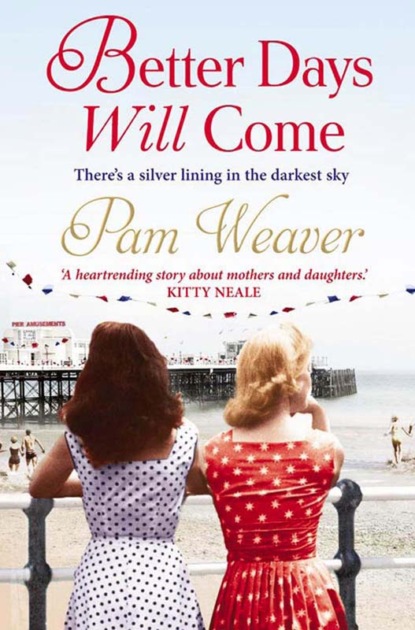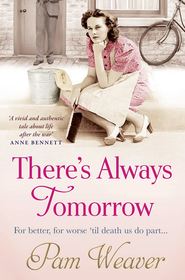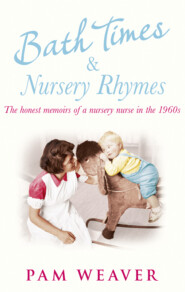По всем вопросам обращайтесь на: info@litportal.ru
(©) 2003-2024.
✖
Better Days will Come
Автор
Год написания книги
2018
Настройки чтения
Размер шрифта
Высота строк
Поля
‘Your sister has left home,’ Grace said, her lips in a tight line, ‘but of course you already knew that, didn’t you?’
Rita’s jaw dropped.
‘Left home?’ Rita looked so shocked, Grace was thrown. ‘Where’s she gone?’
‘I don’t know.’
‘What do you mean, you don’t know?’
‘Precisely what I said, I don’t know,’ cried her mother, her voice full of anguish. ‘I was so sure you’d know all about it.’
Rita seemed bewildered. Grace threw an enamel bowl into the stone sink with a great clatter. All the while that she had believed Rita knew about Bonnie, there was the hope that she could bully her whereabouts out of the girl. ‘Mum?’
For a few seconds, Grace stood with her back to her daughter, her hands clenching the sides of the stone sink, as if supporting the weight of her body, then she turned round. Rita was alarmed to see the tears in her eyes. Grace reached out for her but when Rita stood up, scraping her chair on the wooden floor behind her, she ran upstairs. Grace could hear her opening drawers, looking in the wardrobe and searching for the battered suitcase that they kept under the bed. As she listened, she relived every moment of her own fruitless search not half an hour ago. She opened the stair door and sat down. A moment or two later, Rita joined her and laid her head on Grace’s shoulder.
Rita chewed her bottom lip. Left home … Bonnie didn’t confide in her much these days, but Rita was sure she would have said something if she’d known she was going away. Was she ill or something?
‘Has she done something wrong, Mum?’
No answer.
‘When is she coming back?’
‘Darling, I’ve told you,’ Grace sighed. ‘I don’t know.’
Rita’s stomach fell away. She couldn’t bear it if Bonnie was gone. Sometimes Bonnie and her mother had words but neither of them held grudges. It just wasn’t their way. A sudden thought struck her. She lifted her head. ‘Shall I go and see if she’s at Sandra’s place?’
‘She’s not at Sandra’s. She’s gone to London.’
‘London?’
‘She told me in a note.’
‘What note?’
Grace stood up and they both went back into the kitchen. She showed Rita the single sheet of paper.
‘I shall never forget you and Rita … it all sounds so final,’ said Rita.
Her mother couldn’t look her in the eye. She got the saucepan out of the cupboard, put it onto the range and reached for a couple of potatoes. ‘Let’s clear the table please.’
Rita gathered her schoolbooks into a pile. Tears were already brimming over her eyes. Why go to London? It was fifty miles away. Bonnie didn’t know anyone in London, did she? Rita opened her mouth to say something but thought better of it when she saw her mother’s expression.
‘There’s nothing we can do, love,’ Grace said firmly but in a more conciliatory tone. ‘Your sister has left home. I don’t know why she’s gone but it’s her choice and we’ll just have to get on withit.’
The potatoes Grace had cut up went clattering into the pan. She covered them with water before putting them on the range. Their eyes met and a second or two later, unable to contain her grief any more, Rita burst into tears and ran upstairs.
Victoria station was alive with people. Bonnie had arrived in the rush hour. She went straight to platform 12 as agreed with George, but after waiting a long two hours, she was so desperate for the toilet, she had to leave. She wasn’t gone for more than ten minutes but he must have come and gone during that time and she’d missed him. Why didn’t he wait? Where could he have gone? She didn’t know what to do, but she was afraid to move from their agreed meeting place in case she’d got it wrong and he was simply late. As time wore on, it grew colder. The station was getting quieter. She began to feel more conspicuous now that the evening rush hour was drawing to a close, and a lot more anxious. Oh, George, where are you? She scoured the heads of the male passengers, willing George’s trilby hat to come bobbing towards her, but it was hopeless. A few passengers who had obviously been to the theatre or some other posh frock do milled around, talking in loud plummy voices. Bonnie bit back her tears and shivered. She wished she and George could have travelled together but she hadn’t expected Miss Bridewell to let her go early. She’d worked her notice so that she could get the week’s pay owing to her and some of her holiday money. The extra money would come in handy if the job in Stanmore didn’t work out for some reason.
‘I’ve got on to a mate who can put us up,’ he’d told her. ‘Save a bit of money that way. He’s not on the telephone so I’ll go up and make the arrangements beforehand. I’ll meet you at platform 12.’
She saw a party of cleaners emerge from a small storeroom and begin to sweep the concourse and then she noticed a man approaching. Bonnie looked around anxiously. Why was he coming her way? She didn’t know him.
‘Excuse me, Miss,’ he said raising his hat. ‘I couldn’t help noticing you standing there. Has your friend been delayed?’
Bonnie didn’t answer but she felt her face heating up and her heart beat a little faster. Oh, George, she thought, where are you? Please come now …
‘If you’re looking for a place to stay,’ he continued, ‘I know where a respectable girl like you can get a room at a cheap price.’
Bonnie looked at him for the first time. He was smartly dressed in a suit and tie. He looked clean and presentable. He looked like the sort of man she could take home to her mother but she didn’t know him from Adam and she had read of the terrible things that could happen to young girls on their own in London in Uncle Charlie Hanson’s News of the World. She turned her head, pretending not to have heard him.
‘Forgive me,’ he smiled pleasantly. ‘I only ask because I can see you look concerned. I don’t normally approach young women like this.’
Bonnie began to tremble. Oh, where are you, George …
‘Could I perhaps offer you a cup of tea in the tea bar?’ He was very persistent but that was what the News of the World said they were like. Men like him duped girls into going with them and corrupted them into a life of prostitution.
She shook her head. Even though she was tired and sorely tempted, Bonnie didn’t go with him. She had seen the man watching her from behind a pillar for some time and she didn’t like it. She picked up her suitcase and walked towards the newspaper vendor to buy a paper.
Eventually she stopped a passing policeman and after explaining that she had missed her friend, he at first directed her, then, having heard her story about the man who kept pestering her, decided to walk with her to a small hotel just around the corner. Bonnie booked a room for the night. It wasn’t until she got undressed that she realised that the locket George had given her was no longer around her neck. Her stomach fell away. Where had she lost it? Had it come off when she was in that horrible factory? What a ghastly day it had been. Everything was going wrong. Bonnie climbed into bed and cried herself to sleep.
Two
Bonnie woke with a start. She heard footsteps outside her door and someone was banging a gong downstairs. It took a couple of seconds to realise where she was. She glanced at the clock on the top of the dresser: 7.30. When she’d arrived here ten days ago, the receptionist had told her breakfast was between 7.30 and 8.15 and she knew she couldn’t afford to miss it. Her meagre wage packet and holiday money wouldn’t keep her much longer. She had fallen into a pattern of eating as much as she could in the morning and making do with a tuppenny bag of chips and a cup of tea at lunchtime. It was all she could afford.
George had never shown up. Bonnie couldn’t understand why. Something must have happened to him. Was he ill? Had he had an accident? He wouldn’t have deserted her; he wouldn’t. Every night she worried about him and cried herself to sleep. The obvious thing was to go back to Worthing, but what if he’d just been delayed for some reason and she missed him? Bonnie had gone over and over what he’d told her, and their plans together. Everything was crystal clear in her mind – so why wasn’t he here?
As soon as the footsteps had gone she nipped across the hallway to the bathroom and gave herself a quick wash. She was dressed and downstairs by eight.
The dining room looked rather tired. It was wallpapered but, probably because it was so hard to find several rolls of the same wallpaper, it was a mish-mash of non-complementary paper, giving the room a rather confused look. The only empty table was next to the kitchen door and Bonnie preferred to keep herself to herself.
‘Here we are, dear,’ said the waitress as she put a pot of tea and some hot water on the table. ‘Did you sleep well?’
‘Yes, thank you.’ Bonnie poured herself a cup of tea and when she was sure no one was looking, she palmed a couple of slices of bread into her handbag for later. The waitress came back and plonked a plate in front of her. Bonnie stared at the greasy pile and her stomach churned. She tried to force it down but even before she’d left the room she was feeling decidedly unwell. She wasn’t used to big fry-ups in the morning and right now it was the last thing she wanted to eat.
Every morning as they left the dining room the guests were told they had to leave their rooms by 10am and that they couldn’t return before 2pm in order to facilitate the cleaning. Dinner was at 6pm sharp. Having forced down as much of the greasy breakfast as she could manage, Bonnie booked herself in for one more night. George was bound to turn up at the station tonight. He wouldn’t let her down. Would he?
As usual, her first port of call was Victoria station where she enquired if anyone had left a message for her. It didn’t sound right for a respectable young woman to be chasing a man so she pretended she was married. ‘I was supposed to be meeting my husband,’ she told the station master. ‘Mr George Matthews.’ The station master shook his head. ‘Never heard of him.’ She was bitterly disappointed. Perhaps it was time to accept the fact that George wasn’t coming. She didn’t want to think of a reason why he wasn’t coming and she really couldn’t go back to Worthing, so she’d have to make another plan. She was positive that George wouldn’t have let her down if he could help it. He wasn’t that sort of man. He loved her. He wanted their baby as much as she did. True, the baby wasn’t planned, but George was fine about it. She remembered the moment he’d given her the locket.
‘One day we shall put a picture of our baby in it,’ he’d smiled.
Tears pricked her eyes but she wouldn’t give way to them. What good would that do? The obvious thing was to find Honeypot Lane and the job George had lined up for her; but then another thought crossed her mind. If he had let her down, then perhaps the job in Stanmore didn’t exist either. She hated herself for thinking like this, but should she risk going all that way and using some of her precious resources for nothing? She had to be practical, didn’t she? Her stomach churned. She didn’t want to be practical. She wanted George.
Once Bonnie had lost her fight to keep her breakfast down, she decided to set off to find a job of her own. She remembered that when she’d scanned the evening paper she bought on that first night, she’d come across an advertisement for an employment agency. She had left the newspaper on her chest of drawers and whoever cleaned her room had never moved it. Bonnie now made a careful note of the address.
The offices of the London and County Domestic Employment Agency left much to be desired but it was very close to the station. From the roadside, she could hear the trains thundering in and out. The façade of the building was grimy with soot and, walking up the stone steps and wandering through the open door, she noticed that the walls themselves were still pockmarked with bomb damage. The paintwork was badly in need of a new coat and the colour scheme in the hallway, dark brown and cream, was from a bygone era. Clearly Harold Macmillan and his Ministry of Housing and Local Government hadn’t got this far yet. When she took her hand from the guardrail even her glove was covered in smut. Should she go in? What if they asked too many questions? How much should she tell them? After twenty minutes of pacing up and down the street, Bonnie climbed the outer steps.
The London and County was three doors along a dingy corridor. As she knocked and walked in, a middle-aged woman with tightly permed hair and wearing some very fashionable glasses looked up from her typewriter. Bonnie introduced herself stiffly and handed over her references.









